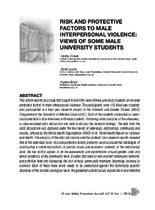| dc.contributor.author | Clowes, Lindsay | |
| dc.contributor.author | Lazarus, Sandy | |
| dc.contributor.author | Ratele, Kopano | |
| dc.date.accessioned | 2010-11-22T14:57:51Z | |
| dc.date.available | 2010-11-22T14:57:51Z | |
| dc.date.issued | 2010 | |
| dc.identifier.citation | Clowes, L., Lazarus, S. & Ratele, K. (2010). Risk and protective factors to male interpersonal violence: views of some male university students: Research and theory. African Safety Promotion, 8(1): 1-19 | en_US |
| dc.identifier.uri | http://hdl.handle.net/10566/170 | |
| dc.description.abstract | This article reports on a study that sought to elicit the views of male university students on risk and protective factors to male interpersonal violence. The participants were 116 third-year students who participated in a final year research project in the Women’s and Gender Studies (WGS)
Programme at the University of Western Cape (UWC). Each of the students conducted six semistructured face to face interviews with male students. Following initial analyses of the interviews, a video-recorded class discussion was held to discuss the research findings. The data from the
class discussion was captured under the four levels of individual, relationship, community and society, utilised by the World Health organization (WHO) in its World Health Report on Violence and Health. The analysis of the class discussion and the students’ own research reports revealed that at the individual level, risk and protective factors primarily revolve around the challenges of constructing a viable masculinity in specific social and economic contexts; at the relationship level, the key factors appear to be the experiences and expectations around gender roles and family dynamics; at the community level, it seems that weak or non-existent community networks and activities feed into increasing the risk of male community members becoming involved in violence. Each of these three levels needs to be understood against the historically specific backdrop of the societal ecological level: the gendered cultural values expressed in and reflectedby the wider social, economic and political contexts. | en_US |
| dc.language.iso | en | en_US |
| dc.publisher | Medical Research Council, Tygerberg | en_US |
| dc.rights | Copyright authors. This work is licensed under a Creative Commons Attribution-Noncommercial-No Derivative Works 2.5 South Africa. | |
| dc.subject | Male interpersonal violence | en_US |
| dc.subject | Risk and protective factors | en_US |
| dc.subject | Male university students | en_US |
| dc.subject | Western Cape | en_US |
| dc.subject | Gender | en_US |
| dc.subject | Masculinities | en_US |
| dc.title | Risk and protective factors to male interpersonal violence: Views of some male university students | en_US |
| dc.type | Article | en_US |
| dc.inquiries | lclowes@uwc.ac.za | |
| dc.privacy.showsubmitter | true | |
| dc.status.ispeerreviewed | true | |

